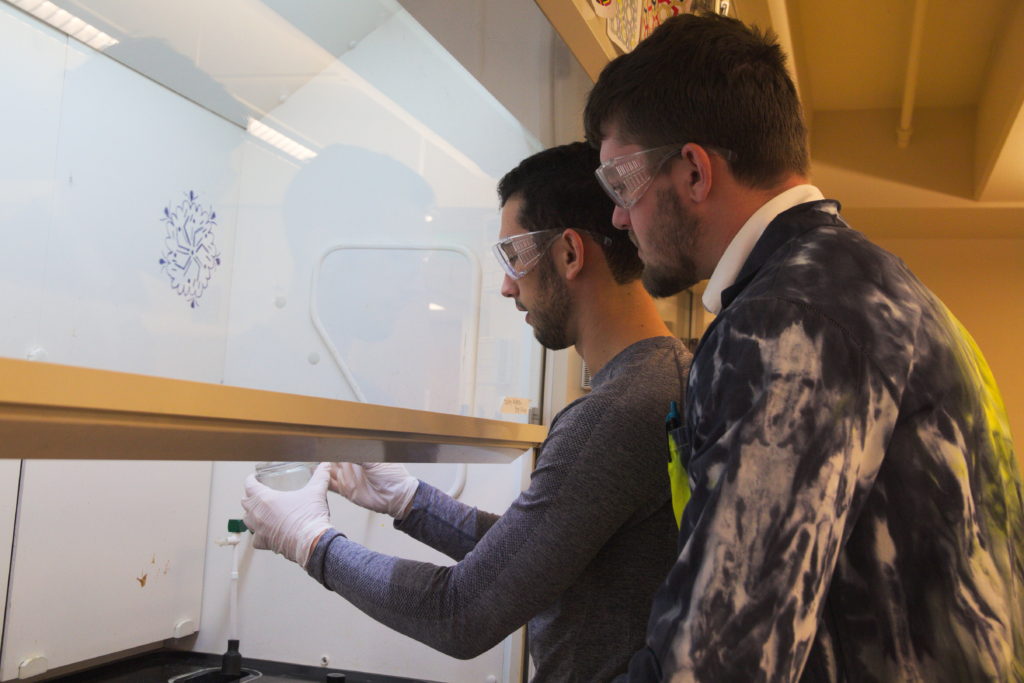
Hillsdale College’s science departments reduced stipends for six-week summer research this year by $400-$1,000 for faculty and students.
Stipends dropped from $2,500 per researcher to $2,100 for each faculty member; $1,800 for every participant in the Laboratory for Advanced Undergraduate Research Education Adapted for Talented and Extraordinary Students, or LAUREATES, Program; and $1,000 for other students. The decrease comes as a result of the departments not receiving funds from the college’s general budget, said Christopher VanOrman, dean of the natural sciences and professor of chemistry.
The stipends come from interest on the college’s endowment, which totals $87,000, VanOrman said. For the past few years, however, the sciences have received up to $63,000 from the general budget to use toward stipends, he said. This year, that expense was cut from the budget to save money, VanOrman said.
“Everyone always wants more money, but we’ll make the cuts work,” said Lee Baron, natural sciences chairwoman and professor of chemistry, “We are very thankful for the funding we have.”
VanOrman credited President Larry Arnn and John Cervini, vice president for institutional advancement, for raising most of the money for scientific research.
“They’ve raised enough money that the interest from the endowment every year is $87,000,” VanOrman said. “That’s well over a million raised, and we’re just working with the interest from that.”
But some students said the smaller stipend may put a financial strain on those who need to make money during the summer.
“Research is basically your job,” senior biochemistry major Gabriela Wong said. “It’s hard to spend six weeks researching and then go home to try to find a job for another six weeks before school starts.”
Plus, the rural Hillsdale community lacks many supplementary jobs students can do while at the college for their research, she said.
Before the LAUREATES Program, however, students would camp on their friends’ couches to do summer research at Hillsdale, Baron said. Now, students are fortunate to receive any stipend, she said.
Senior biochemistry major Emily Nelson performed her research at Aurora St. Luke’s Medical Center in Milwaukee, Wisconsin. She said the decrease in stipend could get Hillsdale students to look for ways to fulfill their research requirement off campus.
“Sometimes students get too complacent,” Nelson said. “It’s easy to say, ‘Oh, I’ve had this professor, I’ll just stay here and do my research with them, too.’ Hopefully, the funding cuts will encourage students to look for opportunities outside of Hillsdale.”
Whether studying chemistry, biology, biochemistry, physics, or psychology, every Hillsdale College science major must complete a summer research project to graduate.
“Research is a big part of your science education,” VanOrman said. “Wherever you are looking, you should go to a program that is going to have you do some research projects.”
Hillsdale’s LAUREATES Program gives 20 students based on their class and GPA each year the opportunity to do a six-week, one-on-one research project with a Hillsdale faculty member and a stipend. Students typically present their research proposals in the fall of their junior year, conduct research during the following summer, and present their results during the fall of their senior year.
The research Hillsdale students do helps them get into some of the best programs in the country, because they have personally done scientific research and can communicate that understanding to others, VanOrman said.
“We send students all over the world doing research, and they’ve done very well,” VanOrman said. “We had one student who did research in the summer, and she wanted to get into the immunology program at the Mayo Clinic. She beat out two Harvard students, because she had a really good research project. She worked a solid six weeks one-on-one with a faculty member, and she could talk about her research in the interview. The Mayo Clinic got excited about it.”
In addition to the LAUREATES Program, VanOrman said students can also apply for Research Experience for Undergraduates, or REU, programs at other colleges and universities.
“It’s the same type of research but at a graduate level institution with faculty who do graduate work and undergraduate work, so they’re taking students into their Ph.D. programs,” VanOrman said. “Most of them are around $4,000 paid for 10-week programs and housing, because the government assists them.”
Wong completed her research through an REU program at the University of Michigan, where she will pursue her master’s degree in the fall.
Wong said the experience developed her laboratory skills and ultimately made her realize she did not want to pursue a career in laboratory work. She also said her time at the University of Michigan gave her an advantage in graduate school applications.
Junior Micah Heinz said he looks forward to the opportunity to do research untried by others before him. His research would continue a project started by VanOrman and previous students on a reaction involving the molecules that release oxygen in the blood. Heinz said he plans to try a new approach to the reaction, potentially using carbon monoxide.
“It hasn’t been done by anyone here, because it’s dangerous,” Heinz said. “But I think it will be really cool. I would like to try it if the other things don’t work.”
The extent of Hillsdale’s research opportunities surprised Heinz, he said.
“I didn’t realize we had much of a science department at all, when I came,” Heinz said. “It’s not well advertised, but all three departments biology, chemistry, and physics — are all really fantastic. All of the professors are just at the top of their field and love teaching and teach well. Everyone loves them, and they get great results.”

